When a quick buck reigns supreme

The leak of question papers, revealed by a TV channel, of a railway recruitment examination under the Public Service Commission (PSC) has brought to the fore the problem of unfairness in public examinations of all kinds—be it selection of candidates for a job, admission to higher education institutions, or student performance at various levels of education. According to media reports, a syndicate comprising, among others, PSC employees and senior officials has been active for over two decades and has orchestrated at least 30 question paper leaks for government recruitment tests, including those for the Bangladesh Civil Service (BCS) exams, over the last 12 years. The PSC had to cancel the 24th BCS preliminary test in 2003 due to allegations of leaked question papers. During the 33rd BCS written test in 2013, there were media reports about alleged question paper leaks and those question papers allegedly getting sold for Tk 5 lakh per set.
Complaints about question leaks, buying and selling of question papers, and bribery for primary school teacher recruitment and secondary school teachers' certification written examinations and oral interviews have been reported periodically. Over the years, there have also been reports of question leaks during Junior School Certificate (JSC), Secondary School Certificate (SSC) and Higher Secondary Certificate (HSC) exams, as well as for university entrance and medical college entrance tests.
The lack of integrity of recruitment examinations disclosed again at this time is particularly egregious when students all over the country are protesting against the existing system of various quotas in government service recruitment, including a high 30 percent reserved for the descendants of 1971 freedom fighters. Freedom fighters themselves or even their children are no longer of age to enter a government job 53 years after the Liberation War. But then the demand for recruitment by merit instead of through quotas becomes futile if the recruitment exams are not fair or not honestly conducted.
Technical solutions are available for stemming question leaks, which require using digital technology that allows preparing multiple sets of questions and their random distribution to examinees at the last moment so they do not know which set of questions one may get at the test ("Plugging question leaks: A technical solution," The Daily Star, February 17, 2018). These solutions have been applied partially in the secondary and higher secondary board examinations; as a result, there have been less complaints about these examinations in recent years. No technical solution, however, can be fool-proof against totally dishonest and greedy people who will go to any length to make a quick buck in a social environment that breeds and tolerates such actions.
Technical means of plugging leaks should be more widely used in both academic and non-academic examinations. At the same time, political conditions have to be created for the technical means to be applied effectively and for violations of rules to be quickly and severely penalised.
The prime minister, during a news conference on July 14 on her China visit, said question leaks and exam irregularities existed in the past, and that her government put a stop to it, but "this group [involved in question leaks] somehow regained ground following the 2018 quota protests." She seemed to imply that those protesting against the existing quota system and seeking a reform are somehow abetting question leaks. It seems to be forgotten that the total abolition of quotas in 2018, in a fit of pique rather than reform through rational consideration, has led to judicial action and has created the current quota debacle.
Oil is poured in the fire when the ruling party leaders insinuate that the quota protesters are sympathetic to Razakars. And how can it be helpful in finding a reasonable resolution of the issue when the ruling party's student arm is unleashed to beat up protesters on campus and in the streets, leading to deaths and injuries? The university administrations remain hapless bystanders of the organised violence occurring on campuses. The university teachers, united in their own protest, are vocal in putting forth their pension benefit demands, but remain silent about the mayhem on campus. All of them have been failing to fulfil their obligation to protect students' freedom to express views peacefully without being subjected to violence by those holding opposing views.
The narrative of corruption at high levels in major institutions of the state at mind-boggling proportions coming out recently, by coincidence or not, adds to the build-up of a mood of dystopia among citizens, including students concerned about their future.
Declaration of assets and income required by public representation rules submitted by candidates for parliamentary and local government elections have revealed staggering percentage of growth of their wealth counted in multipliers of hundreds and thousands. However, the Election Commission (EC), the Anti-Corruption Commission (ACC) and the National Board of Revenue (NBR) have not considered it necessary to ask any question and no candidate has been barred from election on this ground.
One is also reminded of the deplorable state of the country's financial and banking system that has become the instrument for looting peoples' money through loan defaulting and money laundering by a privileged group. Or the much-hyped mega infrastructure projects which are the costliest by world standards and pass on a heavy burden of loan repayment to future generations. In public perception, kleptocracy is the order of the day.
An air of uncertainty and despair engulfs young people. The cloud of dystopia thickens as public perception connects the dotted line between pervasive corruption, greed, inefficiency and ineptitude on the one hand, and lack of accountability and a culture of impunity created by a crony oligarchy of the political class, civil and law-enforcing bureaucracy and a greedily selfish business class working in collusion on the other.
Technical solutions including digital technology should be applied systematically to limit the chances of abusing the public examinations. A rational response to students' grievances about the quotas must be found by political decision-makers. But, above all, the political leadership must recognise the dystopia that submerges young people. The playbook for holding on to power need to change for the good of the regime and the nation.
Dr Manzoor Ahmed is professor emeritus at BRAC University, chair of Bangladesh Early Childhood Development Network (BEN), and adviser to the Campaign for Popular Education (CAMPE). Views expressed in this article are the author's own.
Views expressed in this article are the author's own.
Follow The Daily Star Opinion on Facebook for the latest opinions, commentaries and analyses by experts and professionals. To contribute your article or letter to The Daily Star Opinion, see our guidelines for submission.
This article was published in print on July 20, 2024. Owing to the internet shutdown from the evening of July 18 to July 23, it was uploaded online on July 24, 2024.

 For all latest news, follow The Daily Star's Google News channel.
For all latest news, follow The Daily Star's Google News channel. 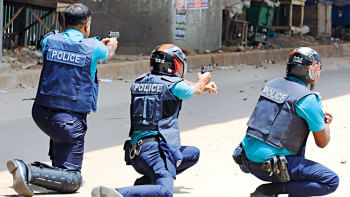
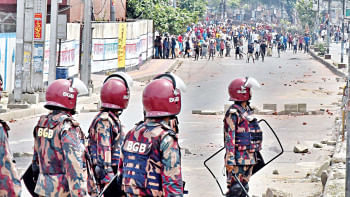


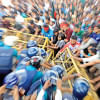
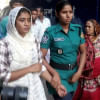

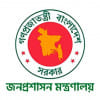
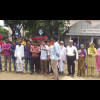

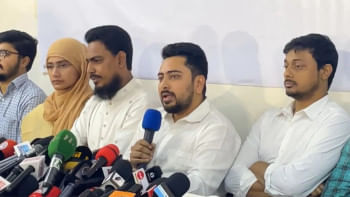
Comments